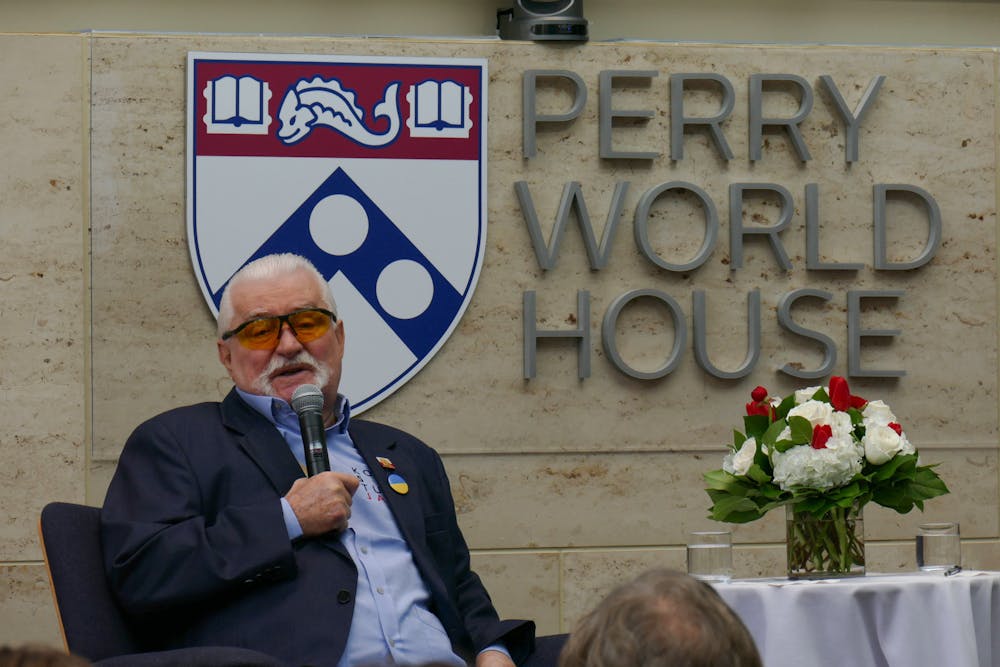Former Polish president and Nobel Peace Prize laureate Lech Wałęsa spoke at Perry World House about geopolitics and the future of democracy in front of over 100 Penn community members on Feb. 12.
Trudy Rubin, a journalist at The Philadelphia Inquirer and visiting fellow at PWH, moderated the conversation. Wałęsa discussed how prospects for democracy have changed globally, given threats posed by Russia to Ukraine and the rest of the Western world, and shared his hopes for the future.
“You are a generation that has a chance of using our success today to achieve a true democracy,” Wałęsa said to the audience. “If you don’t succeed in your trials, you will curse me and our whole generation.”
Wałęsa led Poland's first independent trade union, Solidarity, and played a key role in the country's transition from communism to a liberal democracy. In 1990, he became the country’s first democratically elected president since 1926. When Wałęsa received the 1983 Nobel Peace Prize, his wife Danuta accepted the award on his behalf, as he feared the government would not let him back into the country.
Rubin previously interviewed Wałęsa in the Polish city Gdańsk in 1989, when many Eastern European countries were on the brink of democratization.
At the event, Wałęsa explained that Russia and China are blocking further democratization by using old political methods, such as eliminating term limits for leaders. He recommended a reconstruction of governmental and economic systems.
“For building something new, we need to strip the original foundations,” he said. “We need to establish an agreement for what kind of values we are going to adopt. Half of the world wants to build based on liberties, freedoms, and free markets, while the other half thinks this is not a good idea. We cannot get out of this division.”
Echoing the sentiments of the Cold War, Wałęsa characterized the division as a split between capitalism and communism. He noted the appeal of communism in theory.
RELATED:
Perry World House announces Marie Harf as new executive director
Perry World House names inaugural cohort of non-resident senior advisors
“Many young people support communism because there are so many nice things written in it, like justice and equality,” he said. “But they do not know that it is impossible to achieve this. Nobody succeeded at building communism, and for a long time, no one will succeed.”
Wałęsa, who has a background as an electrician, proposed his own “electrician’s equation” for measuring democracy.
“There are three elements, each counting for 30%,” he said. “Firstly is the constitution and rule of law, secondly is civic engagement, and thirdly — the power of the dollar. 10%, I leave purely to pleasure.”
In order to continue fighting for democracy, Wałęsa said that young people first need to understand which element they want to improve. In Poland, he calculated that the level of democracy is under 50%, so he sees the battle as incomplete.
Wałęsa accompanied his words with an occasional witty remark. When asked what he is most wary of, he mentioned several things: first, Godand his wife, and second, Russia and China.
Wharton first year Kaiden Carey said that he found Wałęsa's comments on the practical failures of communism interesting, considering that Wałęsa spent his whole life fighting against communism.
“More and more young people are thinking about communism, but they haven't seen the effects of it not working like he has, like other people from the Eastern bloc have,” Carey said.
College first year Pètra de Beer, who is from South Africa, said that she found Wałęsa remarks relatable and inspirational.
“So many of the takeaways, the ways [Wałęsa] discusses and looks at democracy, are so similar to the ways we look at it in South Africa,” she said. “The lessons are really universal.”
PWH organized the event in cooperation with the Philomathean Society, Penn’s oldest student organization. The society holds an annual oration each year inviting a notable figure to speak at Penn. Previous speakers include public intellectual Cornel West and primatologist Jane Goodall.
Wharton junior Michal Wyrebkowski, an international student from Poland, served as the Philomathean Society's annual oration director this year. He said that he chose Wałęsa for his respected reputation in Eastern Europe and status as the only living person remaining from TIME's list of most influential statesmen of the 20th century, among other reasons.
Wałęsa left the audience with his hopes for the future and belief that the best way to help accelerate the transition of Russia to democracy is not through armed conflict, but rather through peaceful negotiations and transformation of the political system.
“Based on trial and error in the 80s, we figured out we have to [fight communism] in the Solidarity spirit — not using weapons,” he said.









